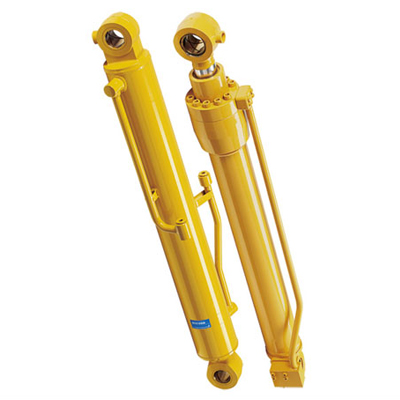Un cilindro de aceite, También conocido como cilindro hidráulico., Es un componente mecánico que se utiliza para convertir la potencia del fluido en fuerza y movimiento mecánico lineal.. Consta de un cilindro, pistón, vástago del pistón, y sellos.
Cilindro de aceite para excavadoras
In the context of excavators, hydraulic cylinders are commonly used to power the boom, brazo, y balde. These cylinders help the excavator to perform tasks such as digging, levantamiento, and moving heavy loads.
The size and specifications of the hydraulic cylinders used in an excavator depend on the size and weight of the machine, as well as the tasks it is designed to perform. Larger excavators typically have more powerful hydraulic systems, which allow for more forceful movements and faster cycle times.
Oil Cylinder Excavators maintenance
Proper maintenance and care of hydraulic cylinders is essential to ensure their longevity and reliable operation. Regular inspections, cleaning, and replacement of worn parts can help prevent damage and extend the life of the cylinders.
-
Cilindro de pluma hidráulica de repuesto para excavadora DOOSAN S225
-
Conjunto de cilindro de pluma de excavadora E374DL CAT
-
Conjunto de cilindro de pluma de excavadora R250-7 HYUNDAI
-
Conjunto de cilindro de pluma de excavadora R480-9 HYUNDAI
-
Conjunto de cilindro de pluma de excavadora PC200-8 KOMATSU
-
Conjunto de cilindro de pluma de excavadora ZX870-5G HITACHI
-
Conjunto de cilindro de pluma de excavadora SK350-8 KOBELCO
-
Conjunto de cilindro de pluma de excavadora E325B CAT
-
Conjunto de cilindro de pluma de excavadora EC700B VOLVO
Proper maintenance of oil cylinders for excavators
Proper maintenance of oil cylinders for excavators is critical to ensure their safe and reliable operation. Here are some maintenance tips to keep in mind:
Regular inspections: Inspect the oil cylinders regularly for signs of damage or wear. Look for leaks, dents, or scratches on the cylinder body or piston rod. Also, check for any signs of corrosion, rust, or pitting.
Keep it clean: Dirt, dust, and debris can cause significant damage to oil cylinders. Por lo tanto, it is important to keep them clean at all times. Use a high-pressure washer to clean the exterior of the cylinder, and make sure the piston rod is always free from dirt and debris.
Lubrication: Regularly lubricate the cylinder with a high-quality hydraulic fluid. Use the recommended type of fluid and ensure that the fluid is at the correct level.
Replace damaged seals: The seals in the oil cylinder play a crucial role in preventing leaks and keeping the hydraulic fluid inside the cylinder. If you notice any damage to the seals, replace them immediately.
Use the correct parts: When replacing parts of the oil cylinder, use only genuine parts from the manufacturer. Using incorrect parts can cause damage to the cylinder and put the operator’s safety at risk.
Regular servicing: It is important to have the oil cylinder serviced regularly by a qualified technician. They can check for any signs of wear or damage that may not be visible during a regular inspection.
By following these maintenance tips, you can help ensure that your excavator’s oil cylinders are always in good condition and working safely and reliably.

